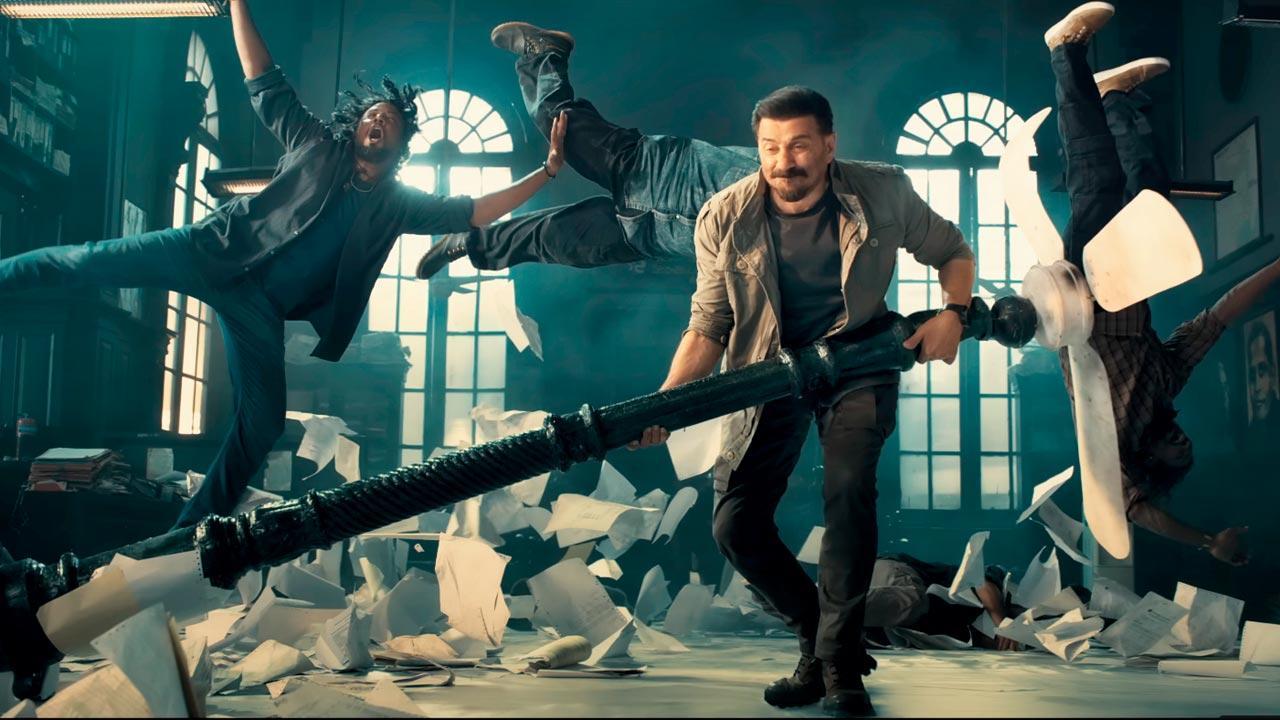Attempts at blockbusters are, by their intrinsic nature, critic-proof. This stuff is parody-proof. You can’t spoof a spoof—whether produced from ultimate self-awareness, or sheer sadism.

Jaat is fronted by Sunny Deol
U/A: Action, drama
Dir: Gopichand Malineni
Cast: Sunny Deol, Randeep Hooda
Rating: 1.5/5
It’s mildly amusing, as an audience, to repeatedly view how mainstream movies are so totally at the mercy of simply making sense of mass audiences’ tastes. As if they were manufacturing a generic pill/drug for entertainment as a specific disease.
Bollywood’s not an exception. American mainstream, tied to Marvel and similar universes, works the same way.
Therein lies the beauty of this picture that you can plot so easily on an Excel spreadsheet, hiring consultants from the South, for a director, to start with—since none in Mumbai are blessed with the same sensibilities to pull off a Telugu/Tamil insane action-avenger, in Hindi.
The point being the ‘pan-Indian’, overblown, gritty revenge drama, in a dusty brown palette; the likes of KGF (Kannada), or Pushpa (Telugu), that successfully pushed themselves up from the South to North (audiences).
Only reversing that direction, with a North Indian hero, instead; attempting a nationwide super-hit, nonetheless.
Consider Shah Rukh Khan in Tamil Atlee’s Jawan (2023), followed up with, say, placing Varun Dhawan at the centre of an Atlee remake, Baby John (2024). Or take Salman Khan in AR Murugadoss’s Sikandar (2025), still in theatres.
This is a film by Telugu director Gopichand Malineni, who had earlier remade the Malayalam Bodyguard, also remade into a Salman Khan super-hit, in Hindi (2011).
So, none of this is new, really. Only the scale’s shot up (also, perhaps the stakes, alongside).
But who do you really plant to the title role, feeling sufficiently safe, commercially. Since we are inherently back to the 1990s, who else, but the action star Sunny Deol, 67, who’s been growling over grovelling villains for three decades plus!
If you had doubts about the film’s purpose, Sunny Paaji clears it reprising his ambitiously damning line from Damini (1993), “Dhai kilo haath ki taaqat, North dekh chuka hai, ab South dekhega (It’s time for the South to experience the power of 2.5 kg hand)!”
Never too late. This sounds an overreach, only once you factor in how many South superstars have been doing this same thing, equally non-stop, for decades, anyway; what gap are we filling here, exactly?
At first glance, I thought this movie’s title Jaat translates, literally, to caste. Which is a touchy topic that mainstream movies don’t touch.
It’s a spelling thing, of course (there is no soft ‘t’ sound in English). The reference here is to the hero’s North Indian caste-group. He extols the pride of being the brave Jat himself.
As a basic prompt on Sora/AI will reveal, the action in this movie must wholly shift to the South; more specifically, Andhra Pradesh; even more specifically, a non-descript coastal village, where everybody, including Makarand Deshpande (‘Mak Sir’) speaks Hindi.
Think of it as watching a Hindi dub then. Small-town theatres in UP-Bihar are evidently more than fine to.
But what’s Sunny Paaji as a Jat hero, in a thin denim jacket and light backpack, like Dirty Harry, in a ‘sambar western’, doing at a village called Motupalli, in Prakasam district, of coastal Andhra? That’s a great question.
He just got off a train. That train was an Ayodhya Special, with devotees dancing to a Shiva taandav score, in praise of Lord Ram. The song’s ‘Jai Shri Ram’.
The arch villain of this hamlet—the new Baap Ji (Om Puri), from Narsimha (1991), with a twin spiral staircase in his mansion—is actually the actor, if I’m not mistaken, also North Indian Jat by origin, Randeep Hooda.
Except, he’s been tanned to play a Sri Lankan Tamil, ex-militant, who smuggled gold into India and built an empire of sorts, subsequently, hacking human heads to instil unlimited fear.
Position this pic as a Lord Ram-like figure, literally taking on Lanka’s Raavan, if you may.
What I find most intriguing about Randeep’s villain, Ranatunga, is his household. He has a Tamil wife (Regina Cassandra), who orders the rape of female cops, who come to get them.
The wife has a mother, with ear-lobes stretching to her jaws, with a vertically challenged Man Friday, who holds her Old Monk rum! Hold my beer, bro.
Attempts at blockbusters are, by their intrinsic nature, critic-proof. This stuff is parody-proof. You can’t spoof a spoof—whether produced from ultimate self-awareness, or sheer sadism.
What’ll interest you is how all of this started. And I don’t mean the stellar opening fight sequence, with Randeep doing the serious heavy lifting.
For all the jangling background music and men, on repeat mode, doing aerobatics to the flying harness—the filmmakers, in general, show great hold over visual craft. If only there was much of written content to back any of it up.
That said, this is foremost about a bunch of goons who drop Sunny Paaji’s plate of idli at a local dhaba. The one-man battalion Sunny/Jaat asks for an apology: “Sorry bol.”
They point him to boss, Ram Suba Reddy, where he demands an apology again. Who, in turn, guides him to his boss, Somulu (Viineet Kumar Siingh; much loved from super-hit, Chhaava); and likewise, his boss, Ranatunga!
“Sorry bol,” says Sunny Paaji still, recalling his anecdote of the fallen idli. The curtains come down for the interval, followed by an item number, ‘Sorry bol.’
By which point, I find myself saying sorry, before we go from Davos to Dhaka Central Jail. Really sorry, bhai! Sincerely.
 Subscribe today by clicking the link and stay updated with the latest news!" Click here!
Subscribe today by clicking the link and stay updated with the latest news!" Click here!








